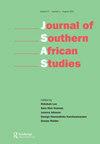Faku’s Tusks: Colonialism, Resistance and Accommodation in Early 20th‐Century South Africa
IF 0.9
4区 社会学
Q2 AREA STUDIES
引用次数: 0
Abstract
An African ploughing his fields in western Mpondoland in 1910 uncovered two elephant tusks at the site of what had once been King Faku’s homestead. This obscure incident in the Transkeian Territories of South Africa provides an entry point to examining the consolidation of colonial bureaucratic control, and African responses to it, in the second decade of the 20th century by the Union of South Africa government. The unearthing of the tusks illuminated, on the one hand, Mpondo attempts to control the relics of Faku, and the memories associated with them, and to reassert traditional authority over the allocation of land; and on the other, efforts by the colonial administration of the Transkei to tighten control over land and strengthen ‘native affairs’ administration. In the process it explores how differing approaches to dealing with the government and contestations for power within Mpondo society impacted on their relations with the colonial state.法库的獠牙:20世纪早期南非的殖民主义、抵抗与和解
1910年,一个非洲人在庞多兰西部耕地时,在曾经是法库国王的宅基地的地方发现了两根象牙。这一发生在南非特兰斯凯伊地区的不为人知的事件,为考察南非联邦政府在20世纪第二个十年巩固殖民官僚控制以及非洲对此的反应提供了一个切入点。象牙的出土一方面表明,庞多试图控制法库的遗迹,以及与之相关的记忆,并重申对土地分配的传统权威;另一方面,特兰斯凯的殖民政府加紧对土地的控制,加强“土著事务”的管理。在这个过程中,它探讨了处理政府的不同方法和Mpondo社会内部的权力争夺如何影响他们与殖民国家的关系。
本文章由计算机程序翻译,如有差异,请以英文原文为准。
求助全文
约1分钟内获得全文
求助全文
来源期刊

Journal of Southern African Studies
AREA STUDIES-
CiteScore
1.40
自引率
0.00%
发文量
73
期刊介绍:
The Journal of Southern African Studies is an international publication for work of high academic quality on issues of interest and concern in the region of Southern Africa. It aims at generating fresh scholarly enquiry and rigorous exposition in the many different disciplines of the social sciences and humanities, and periodically organises and supports conferences to this end, sometimes in the region. It seeks to encourage inter-disciplinary analysis, strong comparative perspectives and research that reflects new theoretical or methodological approaches. An active advisory board and an editor based in the region demonstrate our close ties with scholars there and our commitment to promoting research in the region.
 求助内容:
求助内容: 应助结果提醒方式:
应助结果提醒方式:


